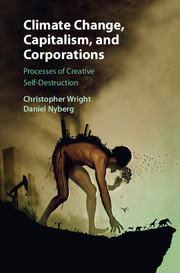Book contents
- Frontmatter
- Dedication
- Contents
- List of figures
- List of tables
- Foreword
- Acknowledgements
- 1 Climate change and corporate capitalism
- 2 Creative self-destruction and the incorporation of critique
- 3 Climate change and the corporate construction of risk
- 4 Corporate political activity and climate coalitions
- 5 Justification, compromise, and corruption
- 6 Climate change, managerial identity, and narrating the self
- 7 Emotions, corporate environmentalism, and climate change
- 8 Political myths and pathways forward
- 9 Imagining alternatives
- Appendix
- References
- Index
5 - Justification, compromise, and corruption
Published online by Cambridge University Press: 05 October 2015
- Frontmatter
- Dedication
- Contents
- List of figures
- List of tables
- Foreword
- Acknowledgements
- 1 Climate change and corporate capitalism
- 2 Creative self-destruction and the incorporation of critique
- 3 Climate change and the corporate construction of risk
- 4 Corporate political activity and climate coalitions
- 5 Justification, compromise, and corruption
- 6 Climate change, managerial identity, and narrating the self
- 7 Emotions, corporate environmentalism, and climate change
- 8 Political myths and pathways forward
- 9 Imagining alternatives
- Appendix
- References
- Index
Summary
But what all these climate numbers make painfully, usefully clear is that the planet does indeed have an enemy – one far more committed to action than governments or individuals. Given this hard math, we need to view the fossil fuel industry in a new light. It has become a rogue industry, reckless like no other force on Earth. It is Public Enemy Number One to the survival of our planetary civilisation.
(McKibben, 2012)Mounting concern over climate change highlights the fundamental conflict between economic expansion and a finite environment (Jackson, 2009). The implications of this tension are profound. Yet an increasingly common response is to further incorporate the environment within market capitalism. As noted earlier for instance, the UK government recently initiated an ‘Ecosystem Markets Task Force’ to review opportunities for the business sector to ‘value and protect nature's services’ by incorporating the environment within the market system (DEFRA, 2012). It is illustrative of a growing and disturbing trend for the environment to be accorded a market value and for corporations to be portrayed as the central institutions through which that value should be maintained.
Concepts such as ‘natural capitalism’ and ‘corporate environmentalism’ further underline the ‘business case’ for the environment through new products, markets, and forms of technological innovation. The central argument is that the environment and corporate profitability can benefit concurrently (Esty and Winston, 2006; Hawken et al., 1999; Kurucz et al., 2008). Thus through a process of commensuration the resolution of environmental problems is presented as best achieved through assigning a monetary value to nature – converting ‘different qualities into a common metric’ (Espeland and Stevens, 1998: 314).
We have already examined how environmental ‘risks’ are calculated and exchanged. This, too, demands the convenient incorporation of the environment into the market. The overriding lesson is that domains that have historically stood outside the capitalist system now find themselves, along with a much broader swath of civil society, far more susceptible to marketisation in the face of neoliberalism's continued rise (Asdal, 2008; Crouch, 2011; Fourcade, 2011; Harvey, 2005).
- Type
- Chapter
- Information
- Climate Change, Capitalism, and CorporationsProcesses of Creative Self-Destruction, pp. 98 - 119Publisher: Cambridge University PressPrint publication year: 2015



